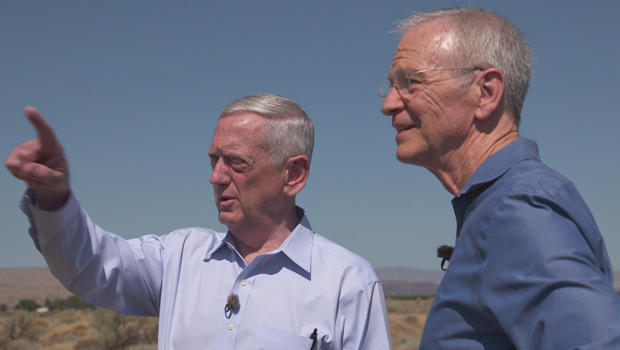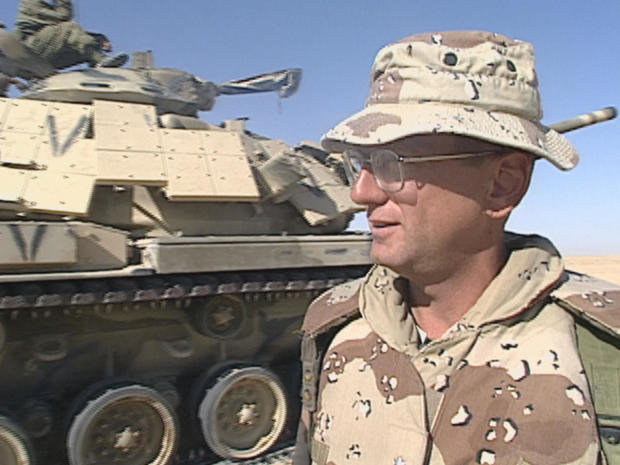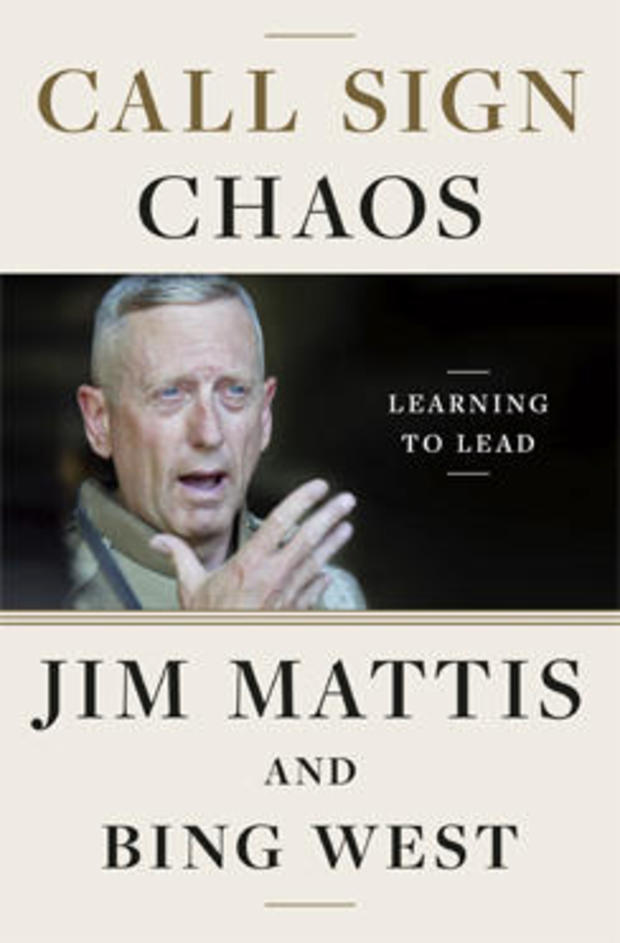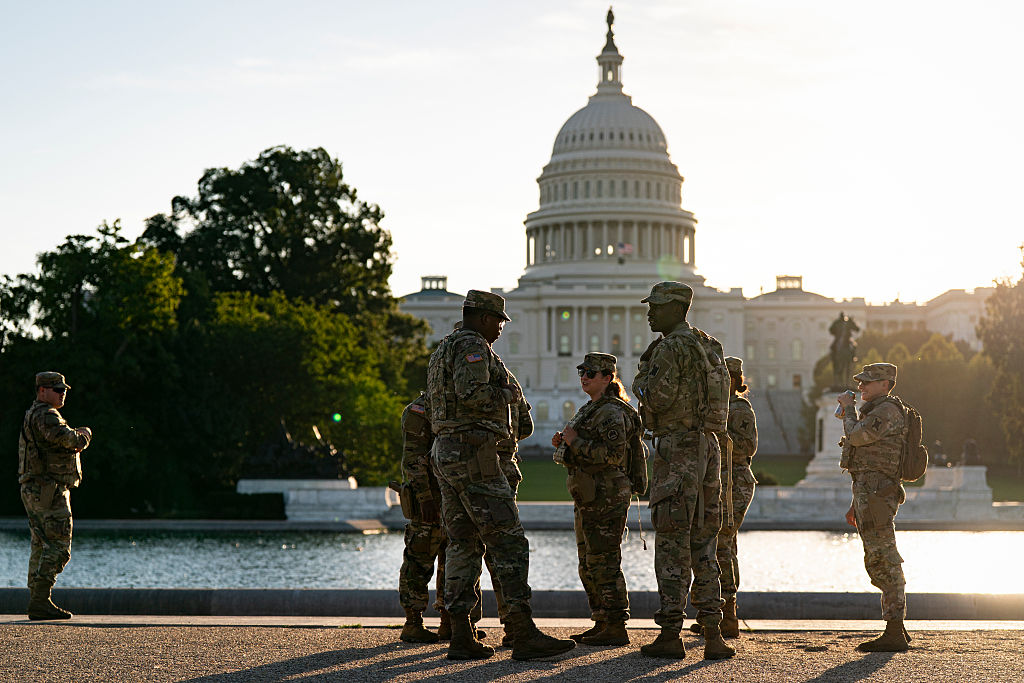Gen. Jim Mattis on war and Trump
James Mattis served more than 40 years in the Marines, much of it commanding troops in battle. But he almost didn't make it to boot camp.
It was the dead of winter 1971, and he very nearly fell to his death from a ridge outside his hometown of Richland, Washington. "I fell onto the ice, and I was on my way, coming down that ridge line much faster than I ever anticipated," he said. "The next thing I knew I woke up and there was blood all over the ice."
"America's enemies almost caught an early break," said national security correspondent David Martin.
"Well, yeah, but I assure you I was a pretty average Marine. There were a lot of other Marines who could have taken my place and done just as well as me," he said.
Now retired from the Marines and no longer President Donald Trump's defense secretary, he is back where he grew up, a stone's throw from the Columbia River.
"The river was a big part of our lives," Mattis said. "Not a day in the summer went by when we would be in the river, swimming it."
The young Mattis also camped here in summer, and hunted in fall. "This is heaven on earth," he said.
Martin asked, "Were you free to roam as a kid?"
"Very much so, very much. I started hitchhiking when I was about 13 and just kept right on going."
And he ended up in jail, more than once. "I'd been in a few scrapes along the way," he said. "Partying too much one night under age in college, and spent some time in jail. And also got in a few too many fights along the way when I was out hitchhiking around the American West.:
"So, you got into the Marine Corps with a police record?"
"Yes, I did."
Along with fellow Marine Bing West, Mattis has written an autobiography titled "Call Sign Chaos." That stands for "Colonel Has Another Outstanding Suggestion," his staff's wry response to his frequent brainstorms, as in, Oh my God, what's he going to think up next?
"That's probably a pretty apt description of how they looked at the chaos I brought," Mattis smiled.
That chaos was inflicted on the enemy, beginning with the Iraqi army in the first Gulf War, which is where Martin first met Mattis on the eve of battle in 1990. He asked Mattis then, "Have you been in combat?"
"No, I have not."
"You worry about how you're going to react?"
"No, I have the easiest job in the battalion, commanding it. The men, I have no doubt about them and they'll carry me right along. No doubt at all."
Mattis was taking a force of 1,200 men into the teeth of Iraqi minefields and artillery. Martin asked him now, "You weren't about to admit to me that you had any doubts on the eve of battle?"
"True."
"Did you?"
"We got the word that we were going to lose hundreds killed and wounded," Mattis said.
Martin asked, "I remember thinking at the time that this Lieutenant Colonel nobody's ever heard of has got to decide which of these Marines goes first."
"That's the tough part, deciding who's going to, who's going to lead the assaults."
"How do you steel yourself to make those life and death decisions?"
"I made it clear that no commander was to report to me their casualties unless they could no longer continue to fight," Mattis replied. "I'd grieve later."
In four days of fighting Mattis didn't lose a single Marine, and his men rolled into Kuwait cheered as liberators. Victory would never again come so easily.
After 9/11, Mattis led a force of 4,000 Marines into southern Afghanistan, setting up an outpost called Rhino. "There's a million things that can go right or wrong," he said that November. "We'll see how many come out on our side."
It was the deepest air assault ever conducted by the Marines. But Mattis wanted to go deeper. "We were restricted by higher headquarters. We were limited in what we, what offensive operations we could do," he told Martin.
Was that frustrating? "I couldn't understand the timidity and why it was taking so long."
While Mattis was at Rhino, Osama bin Laden was 400 miles away in the Tora Bora Mountains – and Mattis had the helicopters to get there: "We would basically block the escape routes and then we would move up in the two valleys. We were very confident that we had a good fix on him, and as we pushed up those valleys he would have to move, and at that point we'd kill him."
It was the Bush Administration's best chance to get America's worst enemy, but the order never came. "We in the military missed an opportunity," Mattis writes in his memoir.
Martin asked, "You willing to say now that you could have gotten him?"
"You can never give that kind of certainty," he replied, "but he'd have had a hell of a time getting out if we'd gotten those troops in."
Mattis left Afghanistan to take command of a Marine division, and a mission he never saw coming – the invasion of Iraq. "I was somewhat flabbergasted," he said. "I didn't think Saddam Hussein could do much in terms of threatening us. … There was a problem there, but I thought it could be solved other than us invading them."
The Marines rumbled toward Baghdad in what Bing West described as a "run and gun offense."
"Speed," said Mattis. "We had to move quickly. Any enemy given enough time can adapt to a circumstance. If you don't keep the tempo up, then they can dig in their heels, and then you start paying more of a price."
His Marines famously toppled the statue of Saddam Hussein but nine months later found themselves engulfed by an insurgency: "The enemy was rising everywhere. The tribes had gotten furious. Anyone reading a history book knows what's going to happen at this point. There's gonna be violence. And we didn't have enough troops to contain it."
Mattis was in the thick of it, with 29 gunners, drivers, radio operators and aides who moved with him around the battlefield. "And 17 of those 29 lads would be killed or wounded over the next four months, to give you an idea of just how bad it was. And I'm a general; I'm not in the toughest fighting."
The toughest fighting was in the terrorist stronghold of Fallujah, which Mattis was ordered to liberate. He thought it was a mistake to use so much firepower in a city of 300,000.
Martin asked, "So, you went into Fallujah, what, against your better judgment?"
"You've got to do it. That's why they're called orders; they're not called likes," he replied. "You don't have to like it. You are ordered to do it."
In the midst of the battle, the images of urban combat became too much for the Bush Administration, and Mattis was ordered to call it off. "I could not fathom why we'd been ordered to attack in the way we were in the first place, or why we would stop deep inside the city and then pull back," he said.
He writes, "The impact of such incoherence ... cannot be overstated. Dizzying is the appropriate word."
Martin asked, "How does it feel to be told, 'Uh-oh, never mind'?"
"You've gotta have confidence that what you're doing is right," Mattis said. "And if it's right to break the back of the terrorists, then do it, just do it. Do it as well as you can. Protect the innocent to the degree you can, but don't get wobbly when the going gets tough."
"And the Bush administration got wobbly?"
"Yes," he replied.
With Fallujah still in enemy hands, Mattis went into the city to confront face-to-face one of the sheikhs who backed the terrorists. "I simply made certain my carbine was laying across my lap, and I just reached down and I thumbed it over onto burst fire so that he'd hear it. And he said, 'Do I look like a terrorist?' And I leaned forward at him and I looked at him, said, 'Well, yes, as a matter of fact you do.'"
Exploits like that earned Mattis a nickname: Mad Dog. "It's not one that I've ever grown fond of, no matter how many times it's used," he said.
Why not? "It has the idea incorporated into it of just someone who's thoughtless, someone who's simply abrasive, or aggressive for aggressiveness' sake."
His aggressiveness is informed by a personal library that once contained 7,000 books. "I'll bet I read about 90 percent of them," he said. "I wouldn't claim I read all of them, but by and large, yeah. I don't get a book unless I'm going to read it."
And underline it, as he did with his copy of "The Meditations of Marcus Aurelius," the Roman emperor and Stoic philosopher. "I would carry copies of this in my rucksack when I was overseas," he explained, "because if something wasn't going well you'd pull that out and say, 'Don't feel sorry for yourself. You're not a victim. You choose the kind of way you're going to react to this.'"
From "Meditations of Marcus Aurelius":
"Begin each day by telling yourself: Today I shall be meeting with interference, ingratitude, insolence, disloyalty, ill-will, and selfishness – all of them due to the offenders' ignorance of what is good or evil."
For all his reading, Mattis can sometimes sound trigger-happy. In 2005, when he told an audience, "It's a lot of fun to shoot some people ... I like brawling," it came across to many as sounding a little bloodthirsty.
"Yeah, well, I'm not tormented by saying we'll stand up for freedom," Mattis said.
Martin said, "I remember running into you while you were still dealing with the aftermath of that, and you said, 'It's only pressure if you feel it.'"
"Yeah. Marcus Aurelius!"
"When have you felt pressure?"
"I put pressure on myself, but I don't feel pressure from others."
Part 2
Before James Mattis parted ways with President Trump, he was ousted by President Obama. He was a four-star general in command of all U.S. forces in the Middle East. It ended for him and the Obama administration when he left office early.
"You were relieved of command," said Martin
"I was detached early and replaced early."
"So, the president essentially had lost confidence in you?"
"I believe so," Mattis said. "I won't speak for the president."
According to Leon Panetta, who was Secretary of Defense at the time, the Obama White House regarded Mattis as "too eager for a military confrontation with Iran."
Iran had been caught plotting to assassinate Saudi Arabia's ambassador to the U.S. by blowing up a popular Georgetown restaurant. As far as Mattis was concerned, Iran had intended to commit an act of war, what would have been the worst attack on U.S. soil since 9/11. "They're gonna do it with a bomb, so you can imagine … what the carnage would have looked like," he said.
In "Call Sign Chaos," Mattis writes: "I believed we had to respond forcefully. My military options would raise the cost for this attack beyond anything [Iran's leaders] could pay."
But the Obama Administration treated it simply as a crime, arresting a low-level courier and sending him to prison for 25 years.
Mattis wrote: "My traction inside the White House was eroding. The White House was wary of my command ... and increasingly distrusted me." In December of 2012 he was forced into retirement.
He said he was "quite certain" that his government service was done.
But the surprise election of Donald Trump changed all that.
The president-elect met Mattis only once (remarking in November 2016 that the general was "the real deal"), but that was enough. He nominated General James "Mad Dog" Mattis to be his Secretary of Defense.
When asked if he expected to serve a full four years, Mattis replied, "Of course."
"You only made it halfway," said Martin.
"That's fair. But there comes a time when you have to look at it and say, 'Are you aligned with the person you're working with?'"
In his first television interview about his resignation, Mattis was asked by Martin about his departure: "You resigned the day after the President announced that the U.S. was pulling all its troops out of Syria."
"Yes."
"Did that decision have anything to do with you ...?"
"Absolutely, it did."
"What about the decision to withdraw from Syria?"
"I disagree with it."
Because? "Because we need to maintain enough influence there that we don't see the same thing that happened when we withdrew from Iraq," he replied.
Mattis believed a sudden pullout would undermine the campaign against ISIS, and betray allies who were fighting alongside the Americans.
In his resignation letter, he wrote, "My views on treating allies with respect are strongly held."
Mattis said, "This was how I saw the strength of America, that we keep our alliances together and keep them tight. And if I wasn't the right person to do this, then the President needed someone more aligned with his views."
"This is a blunt letter," said Martin.
"I was honest and forthright with him about where it was that I was parting ways."
Mattis had planned to stay on for two months, but the president decided to replace him immediately, and twisted the knife by tweeting: "When President Obama ingloriously fired Jim Mattis, I gave him a second chance."
Mattis has not talked with Mr. Trump since.
As for other differences Mattis had with the president, he noted, "I will not speak ill of a sitting president. I'm not going to do it."
But he will say this: "He's an unusual president, our president is. And I think that especially with the, just the rabid nature of politics today, we've gotta be careful. We could tear this country apart."
- Mattis takes swipe at Trump in new book: "I did as well as I could for as long as I could" ("CBS Evening News," 8/28/19)
- James Mattis had history of disagreements with Trump before resignation ("CBS This Morning," 12/21/18)
For about $20 you can buy a Mattis for president T-shirt (or Mad Dog, if you prefer).
And the way he works a local bar (the same bar, as it happens, where he'd used a fake ID to buy his first underage drink) is as smooth as any politician, although he's known many of the people here for years. "Back where I belong, you know," he said.
He's not campaigning, but the topic comes up.
One man said, "When you get ready to run, I'll help you."
"Oh, Jesus, Terry, I got more people asking me to do it," Mattis said.
"I know you want to do it and you just don't ..."
"No, I don't!"
"You don't want to?"
"Terry, it would be like a five-year jail sentence," Mattis said.
For now, James Mattis is teaching at Stanford, and serving on the boards of corporations, and repeating to himself one of the lessons all his reading of history taught him: "You just have a role to play for a little while, so play it well, but don't let it go to your head."
READ AN EXCERPT: "Call Sign Chaos" by Jim Mattis and Bing West
For more info:
- "Call Sign Chaos: Learning to Lead" by Jim Mattis and Bing West (Random House), in Hardcover, eBook and Audio formats, available via Amazon
Story produced by Mary Walsh.






